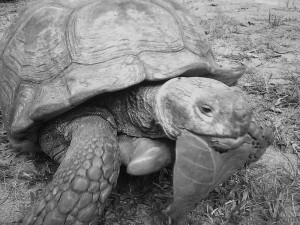ÌJÀPÁ/Àjàpá JẸ ÈRÈ AIGBỌRAN ÀTI ÌWÀ Ọ̀KANJÚÀ: THE RESULT OF DISOBEDIENCE AND GREED

The tragic Tortoise — having eaten food made for his wife by the Herbalist — there really should have been a warning as to consequence. Image is courtesy of @theyorubablog
Ní ayé àtijọ, Yáníbo ìyàwó Ìjàpá/Àjàpá gbìyànjú títí ṣùgbọ́n kò rí ọmọ bí. Ọmọ bíbí ṣe pàtàkì ní ilẹ̀ Yorùbá, nítorí èyí ìrònú ma mba obìnrin tí kò bá ri ọmọ bi tàbí tí ó yà àgàn. Yáníbo ko dúró lásán, ó tọ Babaláwo lọ láti ṣe ãjo bí òhun ti le ri ọmọ bí.
Babaláwo se àsèjẹ fún Yáníbo, ó rán Ìjàpá láti lọ gba àsàjẹ yi lọ́wọ́ Babaláwo. Babaláwo kìlọ̀ fún Ìjàpá gidigidi wípé õgùn yí, obìnrin nìkan ló wà fún, pé kí o maṣe tọwò. Ìjàpá ọkọ Yáníbo ṣe àìgbọràn, ó gbọ õrùn àsèjẹ, ó tanwò, ó ri wípé ó dùn, nítorí ìwà wobiliki ọkánjúwà, o ba jẹ àsèj̀ẹ tí Babaláwo ṣe ìkìlọ̀ kí ó majẹ. Ó dé́lé ó gbé irọ́ kalẹ̀ fún ìyàwó, ṣùgbọ́n láìpẹ́ ikùn Ìjàpá bẹ̀rẹ̀ sí wú. Yorùbá ni “ohun ti a ni ki Baba mágbọ, Baba ni yio parí rẹ”. Bi ikùn ti nwu si bẹni ara bẹ̀rẹ̀ si ni Ìjàpá, ó ba rọ́jú dìde, ó ti orin bẹnu bi o ti nsáré tọ Babaláwo lọ:
Babaláwo mo wa bẹ̀bẹ̀, Alugbirinrin 2ce
Õgùn to ṣe fún mi lẹ́rẹkan, Alugbinrin
Tóní nma ma fọwọ́ kẹnu, Alugbinrin
Tóní nma ma fẹsẹ kẹnu, Alugbinrin
Mo fọwọ kan ọbẹ̀, mo mú kẹnu, Alugbinrin
Mofẹsẹ kan lẹ mo mu kẹnu, Alugbinrin
Mobojú wo kùn o ri gbẹndu, Alugbinrin
Babaláwo mo wa bẹ̀bẹ̀, Alugbinrin 2ce
Play the Tortoise’ tragic song here:
You can also download the Yoruba alphabets by right clicking this link: Babalawo mo wa bebe(mp3)
Nígbátí ó dé ilé́ Babaláwo, Babaláwo ni ko si ẹ̀rọ̀. Ikùn Ìjàpá wú títí o fi bẹ, tí ó sì kú.
Ìtàn yí kọ wa pe èrè ojúkòkòrò, àìgbọ́ràn, irọ́ pípa àti ìwà burúkú míràn ma nfa ìpalára tàbí ikú. Ìtàn Yorùbá yi wúlò lati ṣe ìkìlọ̀ fún àwọn ti o nwa owó òjijì nípa gbígbé õgùn olóró mì lati kọjá lọ si òkè okun/Ìlúòyìnbó lai bìkítà pé, bí egbògi olóró yí ba bẹ́ si inú lai tètè jẹ́wọ́, ikú ló ma nfa. Ìtàn nã bá gbogbo aláìgbọràn àti onírọ́ wí.
ENGLISH TRANSLATION
A long time ago, child birth played an even greater role in Yoruba society and women unable to give birth to a child went through great lengths to conceive. Frantic efforts by all the women to have babies was exemplified by Yanibo, the Tortoise’ wife. Yanibo was no exception at her time, so she went to seek fertility treatment from the Herbalist.
The Herbalist prepared a fertility treatment meal for Yanibo, who sent her husband to collect the meal on her behalf. The Herbalist warned Tortoise strongly not to taste the meal as it was strictly for women. Tortoise smelt the meal on his way home and was thereby tempted as a result of the sweet aroma, he therefore, ate the fertility meal.
On getting home he had to cover up with lies as if the fertility meal was not ready, but in a short while, his stomach began to swell. And so goes the Yoruba saying, “what is hidden from one’s father will eventually be settled by him”. The result of Tortoise disobedience and greed made him suffer unbearable pain, hence he summoned up his last energy and began to sing to attract pity on his way to the Herbalist’s place. Yoruba pleading song: “Babalawo mo wa bebe…”
By the time Tortoise got to the Herbalist, it was too late as the Herbalist had told him earlier that there was no antidote, so the Tortoise died.
This story is used to warn against the grave consequences of greed, disobedience, lying and other vices. It can also be used to warn people who engage in corrupt means to getting rich such as those swallowing wraps of hard drugs, without minding that it might lead to death if such wraps burst in the stomach. The story also serves as a warning to those lying, disobedient and those robbing either individual or government.
Originally posted 2014-11-21 10:45:28. Republished by Blog Post Promoter



I don’t remember the Tortoise dying in this story. Quite the tragedy. To lose his life over a meal. The villain in this story for me is definitely the Herbalist. Who as we know, in today’s world certainly won’t get a NAFDAC or FDA permit for his lethal and poisonous child birth concoction.
I like. Good, very good.
Isese, I love you.
This is a beautiful story, I would love to see more stories like this one.
These stories are going extinct and we need to do all we can to preserve them. It’s our culture.